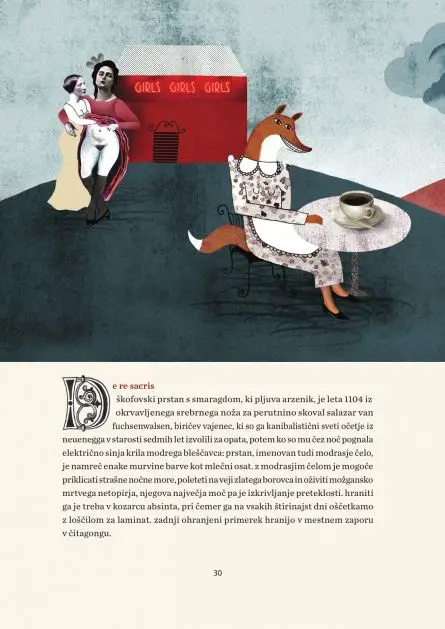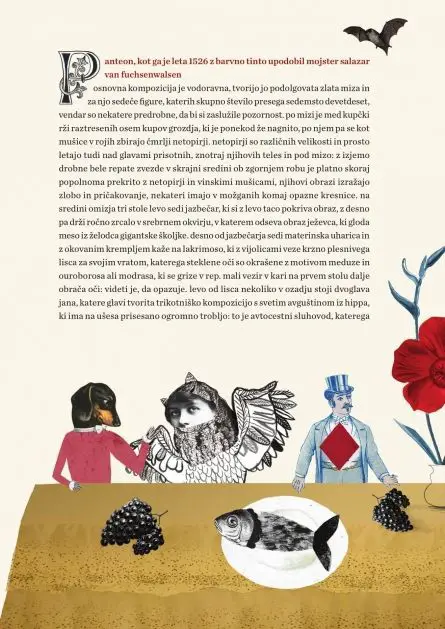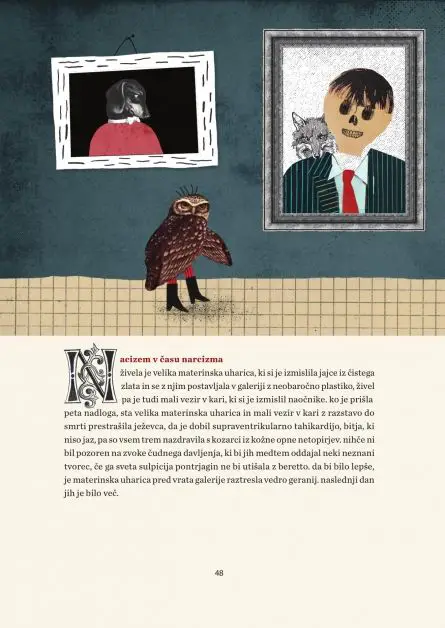Check the date at the top of the page, and you can find all the "morning headlines" stories here. You can also follow us on Facebook and get all the news in your feed.
A schedule of all the main events involving Slovenia this week can be found here
This summary is provided by the STA:
Cerar meets Dačić as he starts official visit to Serbia
BELGRADE, Serbia - Foreign Minister Miro Cerar met his Serbian counterpart Ivica Dačić as he started an official two-day visit to Serbia. The visit is part of the two countries' preparations for a joint 17 December government session, but the pair also discussed EU enlargement and the situation in the Western Balkans. Cerar was quoted by the Slovenian Foreign Ministry as saying that Slovenia would make an effort for EU enlargement to the Western Balkans to be given a fresh impetus with the new European Commission and the EU's new foreign policy chief Josep Borrell. "But just as enlargement must continue and the start of negotiations with North Macedonia and Albania must be launched, so must continue the dialogue between Serbia and Kosovo. Status quo benefits nobody," he said.
Slovenia wants focus on reducing illegal migrations
BRUSSELS, Belgium - Slovenia advocates a comprehensive approach to migrations in the future EU migration and asylum policy. The underlying goal must be to reduce illegal migrations, Interior Minister Boštjan Poklukar told a session of the EU's Justice and Home Affairs Council. It is necessary to relieve the burden on countries in the management of migrations and establish a new European asylum agency. Poklukar also highlighted the costs incurred by local communities along the border, for example damage to infrastructure, and said the EU should make allowance for such damage in its financial plans.
Lower chamber overrides both state budget-related vetoes
LJUBLJANA - The National Assembly overturned both vetoes the upper chamber imposed last week to block the state budget for 2020 and 2021, meaning the 2020 budget will start to be implemented on 1 January as planned. The bill on the implementation of the 2020-2021 budgets had been vetoed due to insufficient funding of municipalities and an emergency bill had been vetoed for envisaging a lump sum increase in pensions instead of a rise in percentage form. Prime Minister Marjan Šarec said common sense had prevailed.
Pahor does not think arbitration report release useful
LJUBLJANA - President Borut Pahor commented on the latest row over the parliamentary report on the arbitration intelligence scandal in a televised interview on Sunday, finding that while the report was useful for the country, its publication at the moment was not. This was because "the neighbouring country or some third party could take only what benefits them from the report", Pahor explained in the interview with public broadcaster TV Slovenija.
Janša expects trouble for govt, early election
LJUBLJANA - Opposition Democrat (SDS) leader Janez Janša expects "an early election sooner or later" because the government coalition is running out of "sweets" to distribute among voters, "which will cause big trouble". If fragmented, minority governments do not last long, Janša said as he commenced on political developments on the sidelines of an event marking the 30th anniversary of the DEMOS government. The current coalition will "keep the government alive for a while longer, but all they can do is harm", said Janša, whose SDS won the 2018 election but could not form a government as practically all parties rejected working with it.
Minister Pivec's future uncertain as report confirms wrongdoing
LJUBLJANA - Agriculture Minister Aleksandra Pivec of the Pensioners' Party (DeSUS) is staying on for the time being even if a report by the Economy Ministry, which was released by news portal Pozareport on Monday, accuses her of wrongdoing in an EU-funded tourism project. Her party boss Karl Erjavec, whom Pivec will challenge for the party leadership in January, said it should be PM Marjan Šarec to decide whether she was still fit to stay on as minister. Pivec reiterated she had done nothing wrong, but announced she would be willing to step down if she lost Šarec's trust. Šarec said he would take a decision after studying the report and talking to Pivec.
Low expectations as climate change conference starts
MADRID, Spain - As the UN Climate Change Conference COP25 opened in Madrid, Slovenian experts and activists do not expect a major breakthrough. Climate researcher Lučka Kajfež Bogataj believes the debates will again go in circles about emissions and historical questions about who is to blame for the situation. She believes this is fruitless because there is no absolute truth about blame. "When we are talking about survival, GDP and economic growth must take a back seat."
Potočnik says Just Transition Fund a good and necessary idea
BRUSSELS, Belgium - Former European Commissioner Janez Potočnik told the STA as a European Green Deal is soon to be revealed by the new European Commission that a fair distribution of burdens will be key for a successful transition to a zero-carbon economy. He believes the emerging Just Transition Fund is a good and necessary idea. "The fact that the Commission is starting its term with a green deal as its first priority task is an important shift, which should not be underestimated," he said.
Importance of dialogue stressed at DEMOS ceremony
LJUBLJANA - President Borut Pahor hosted a reception to mark the 30th anniversary since the formation of the Democratic Opposition of Slovenia (DEMOS), which won the first multi-party elections in 1990. He recalled how dialogue had played an important role in Slovenia's path to independence and stressed that "national unity for independence did not just appear out of nowhere".
Report: C-bank vice governor fails to dispel tax evasion suspicion
LJUBLJANA - The Commission for the Prevention of Corruption has found that Marko Bošnjak, vice governor at Slovenia's central bank, is unable to provide evidence that he has paid tax from the rent he gets for his apartment in Ljubljana, public broadcaster RTV Slovenija reported. Bošnjak was unavailable for comment, but said through his lawyer the procedure was not over yet, as he could still turn to the Administrative Court. The central bank has not yet received the commission's report.
Return on state equity projected to decrease in 2020
LJUBLJANA - Slovenian Sovereign Holding (SSH) expects the state assets under its management to yield a somewhat lower return in 2020 than this year. The draft asset management plan submitted by SSH to the government last week projects a 5.9% return on equity in 2020, down from an estimated 6.2% this year, as a result of the slowdown of economic growth, regulatory demands, and the sale of state-owned banks, which had produced generous dividend yields in previous years.
IMAD sees social protection funding as main challenge
LJUBLJANA - Labour shortages and financing of social protection systems are the main challenges for Slovenia that demand public policy action, the government macroeconomic think tank IMAD points out in its latest annual publication Economic Issues. The two challenges "already significantly affect our community, and will do so even more in the future, which is why they demand public policy measures". To ensure that the social protection systems are sustainable, many public policies should be adjusted, both on the expenditure and revenue sides, it added.
Unior selling its tourism subsidiary Unitur
ZREČE - Unior, a group specialising in forged metals and tools, announced it was selling its tourism company Unitur after it reached a deal to sell its tourism business with creditors a few years ago. As part of a deal to restructure its loans, Unior agreed in 2016 that it would sell its tourism business. Unior has already sold RTC Krvavec, a firm managing the ski slopes on Krvavec, while Unitur manages the Zreče spa and Rogla ski centre.
Several cases of measles recorded in November
LJUBLJANA - The National Institute of Public Health registered seven case of measles in November. One person caught the disease abroad and then infected another five adults in Slovenia, while the seventh case was unrelated to the mini outbreak of the disease. This puts the number of confirmed cases of measles in Slovenia this year to 25, of which two were recorded in foreign citizens. In most of the cases, measles are contracted abroad and brought to Slovenia. There has been a rising global trend of measles infections in recent years, caused mostly by insufficient vaccination coverage, including in Slovenia.
Chestnut Woods wins debut award in Tallinn
TALLINN, Estonia - Stories from the Chestnut Woods won Gregor Božič the first feature film award at the Black Nights Film Festival in Tallinn, Estonia, in what is the first international award for the Slovenian-Italian co-production. Based on Anton Chekhov's short stories and folk tradition of Benečija, an area in eastern Italy populated by ethnic Slovenians, the film features an international cast and crew from seven countries. It won 11 awards at the Festival of Slovenian Film in September.
French-Mexican slasher wins top honours at LGBT film fest
LJUBLJANA - Knife + Heart, a French-Mexican slasher by Yann Gonzalez, won the Pink Dragon, the top honour at the 35th Festival of LGBT Film, which concluded on Sunday. The 2018 film tells the story of Anne, who produces cheap gay porn. The audience award went to Portrait of a Lady on Fire, a French historical drama by director Céline Sciamma that focuses on Marianna, a young painter in the 18th-century France who is commissioned to do the wedding portrait of Héloise without her knowing.
Animated film fest kicks off
LJUBLJANA - The 16th Animateka international animated film festival opened at Kinodvor with a selection of shorts, followed by Bunuel in the Labyrinth of the Turtles by Salvador Simo, a portrait of the surrealist filmmaker Luis Bunuel. The week-long marathon will see 360 shorts and a dozen feature-length films, including 32 in the competition programme, among them Milanka Fabjančič's Liliana, which won the Vesna Award for best animated film at the Festival of Slovenian Film in September.
Iraqi man gets six years for assault on taxi driver, police officer
NOVA GORICA - The Nova Gorica District Court sentenced Iraqi citizen Al Hamdani Yassin Amar to six years in prison for assaulting a taxi driver and a police officer, and an attempted car theft in the Nova Gorica area in July. After serving his sentence, he will be deported from Slovenia. The 26-year-old confessed to the crimes at a pre-trial hearing last week.
Visiting Ljubljana? Check out what's on this week, while all our stories on Slovenia, from newest to oldest, are here
If you're learning Slovenian then you can find all our dual texts here







